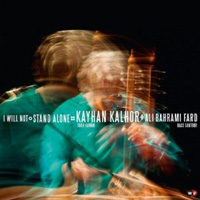In review--Standing together
I Will Not Stand Alone
World Village
I have a small pile of CDs sitting next to my laptop in which Iranian spike-fiddle player Kayhan Kalhor appears. Since reviewing Ghazal’s Rain on ECM in 2003, in which Kalhor performed in a musical exchange with sitarist Shujaat Husain Khan, I have come across a recording each year featuring Kahlhor in collaborations with Iranian, Turkish, American (Brooklyn Rider, a string quartet and Yo-Yo Ma), and Indian musicians. And in each of these recordings, the spike fiddle player (aka kamancheh), offers a transcendental performance. If you see Kayhan Kalhor’s name gracing the cover of a CD, make sure you give that recording a good listen. Otherwise you pass up an opportunity to hear truly exotic music fired by the heart and soul of its performer.
The most recent recording, or musical chapter, I Will Not Stand Alone, brings its listeners a ray of hope, but only after having suffered the torments of the musicians first. Kalhor recorded this collaboration with bass santour (a dulcimer/zither), player Ali Bahrami Fard during a low point in his life. Violence had broken out in Iran leading the Kalhor to a dark place. But in this dark place he composed music based on a Kurdish melody from the Tanbour repertoire, and based on Avaz-e Afshari and Avaz-e Isfahan (traditional music modes). The music runs the gamet from the wailing lament, Hear Me Cry to the playful The Laziest Summer Afternoon and Dancing Under a Walnut Tree, to the defiant title track which closes the album while offering an intense listening experience.
The recording feels languid with tinges of sadness and anguish bursting through. The bass santour's bell-like tones wed to a new instrument shah kaman (a cross between a spike fiddle and a tarhu with a cello-like sound), that was created by Australian instrument maker Peter Biffin. While the musicians perform at an even-tempo without igniting any musical fireworks, listeners still feel that they are treated to the sounds of master musicians. On the short piece, Pluck a Star from the Sky, a frenzied spiked fiddle leads off with the santour shadowing, then the instruments slow down, suspending time. Feels magical.
The musicians describe the album as bittersweet, which takes a cathartic journey through despair, anguish, nostalgia, until it lands on hope and solidarity radiating from music that brings hearts together. If I had to choose one album to describe the healing power of music from darkness and violence, I Will Stand Alone certainly fits that bill. The musicians aren’t just showing up in a studio recording exotic music for fans of traditional music, but they have offered a gift of transcendence during a time when the planet basks in its darkest shadows. There’s a time to mourn, a time to come together in a peaceful gathering, and a time to rebuild our communities. I Will Not Stand Alone acts as a musical reminder that millions of like-minded people unite under the moniker of peace in our time. When it feels like only one of us is standing alone in a room, that one of us is all of us. We never stand alone not with music like this.
http://www.worldvillagemusic.com




Comments
Post a Comment